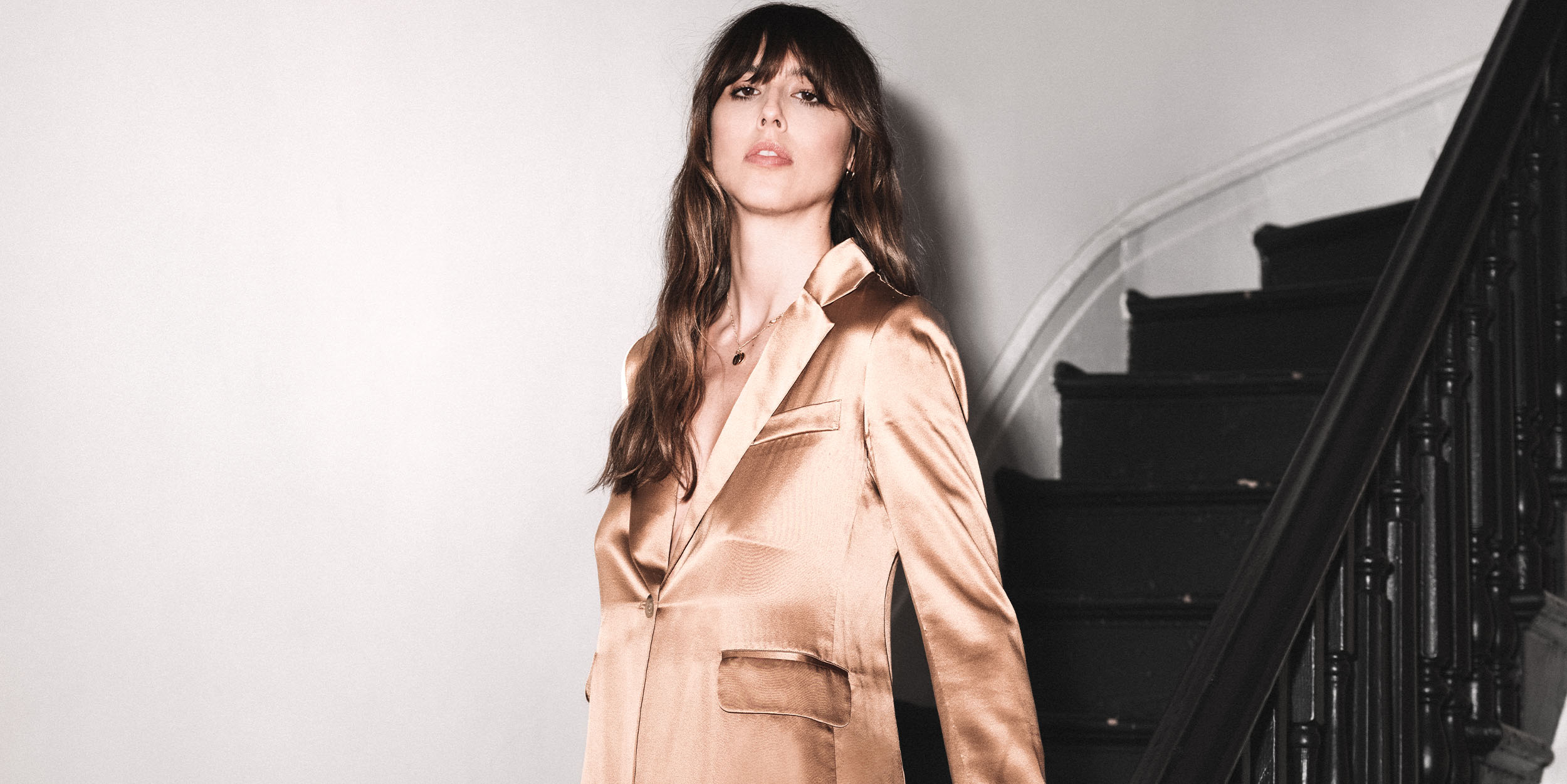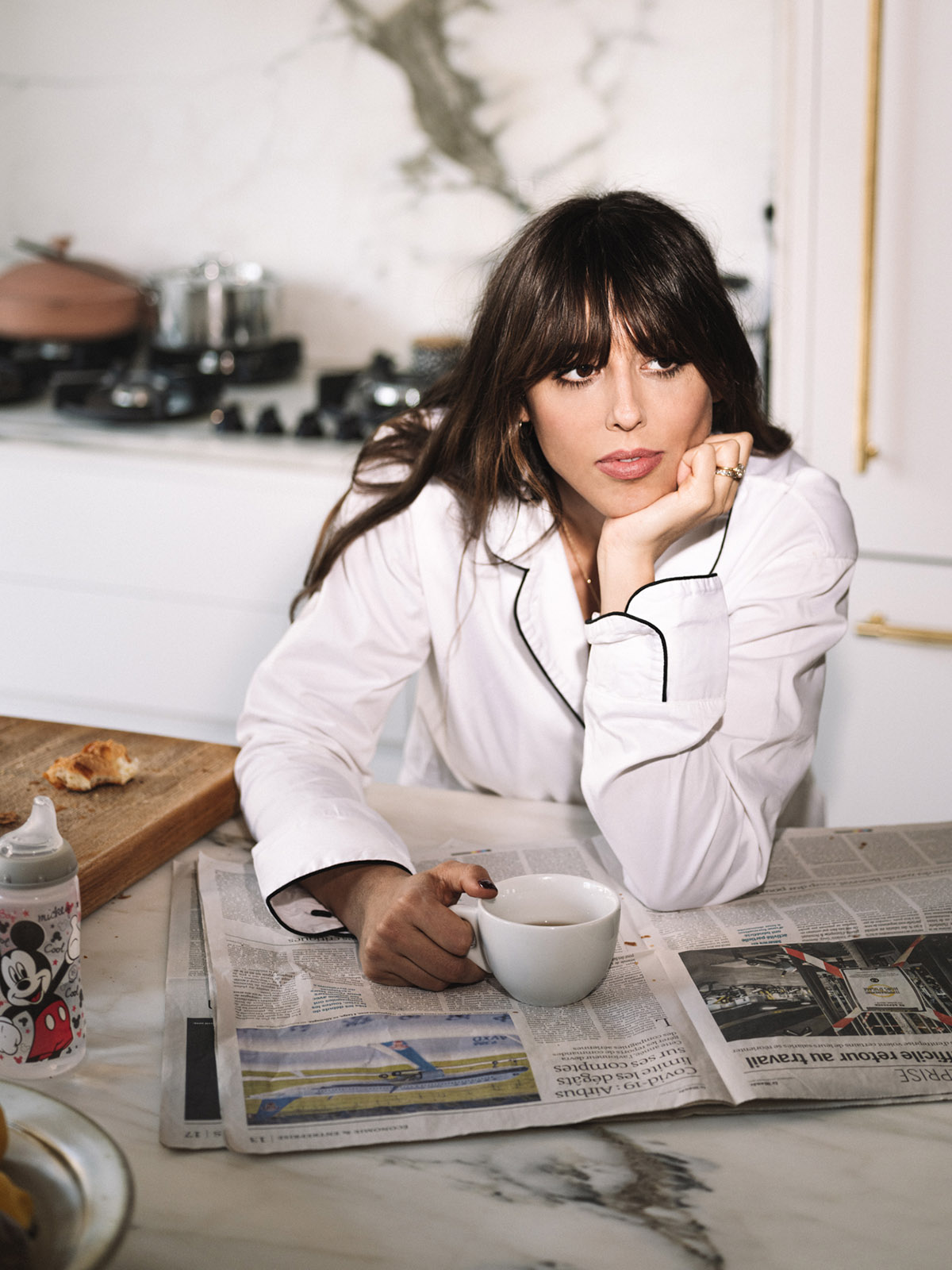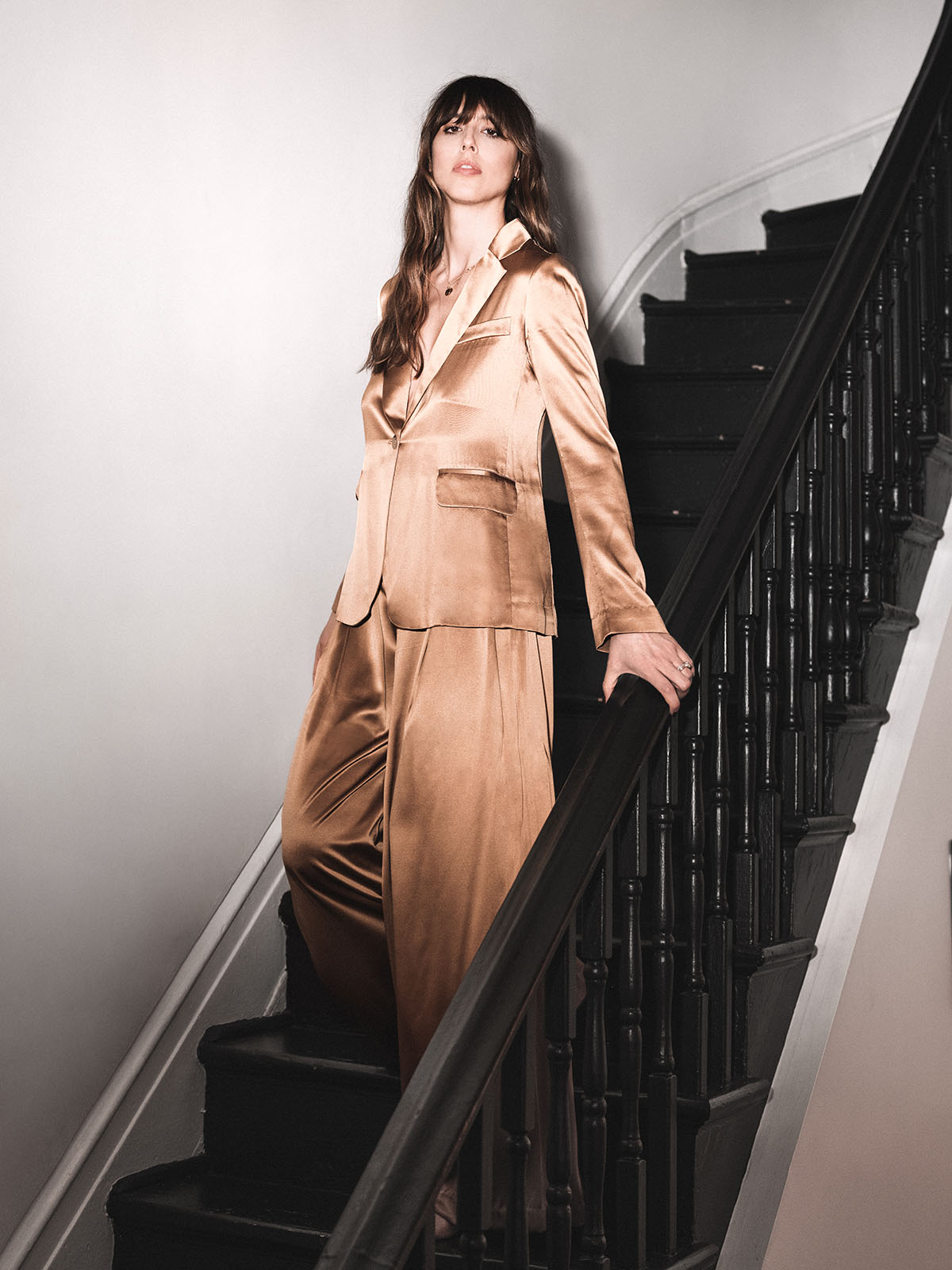The founder of VIOLETTE_FR joins Document to discuss her playful approach to everyday beauty
Known simply by her first name, French makeup artist and entrepreneur Violette started her eponymous brand, VIOLETTE_FR, with a vision: to celebrate individual beauty through creativity with refined, intentional products. The Brooklyn-based CEO and creative director of Guerlain takes a light, reassuring approach—one that makes her customers feel like themselves. Her playful approach to everyday beauty has drawn in a world of makeup lovers.
Trained in fine art at the prestigious École du Louvre in Paris, Violette became interested in makeup as a medium, and moved to New York at only 19 to get to know the industry and carve out her point of view within it. Not unlike the painters she studied, she mixed her own pigments and developed an interest in making luxury glamor practical. Upon the spring product launch at VIOLETTE_FR, Violette spoke to Document about entrepreneurship, fresh inspirations, and how she hopes to reshape conversations around personal beauty.
Kayla Herrera-Daya: What has your experience with makeup taught you about creating for your own brand, VIOLETTE_FR?
Violette: I’ve been working on my brand since 2018 very actively. It’s more the work I’ve been doing throughout my career, because it’s been 17 or 18 years I’ve been doing this. All these steps taught me, at each level, something really important. I don’t have a business background or a marketing background, so I really learned through all these incredible experiences—not so much how to develop products, but about supply chain, and marketing, and understanding how to work with chemists, things like that. What taught me the most about color and developing products, I think, is actually my painting background. I learned in school how to create my own paintings, and about using raw materials to [create].
Kayla: Right. As an artist, you’re not really thinking about the customer.
What I really admire about your site is that it isn’t overwhelming. You’re not selling products for the sake of selling products. There’s something really fresh about being refined and intentional in our routines, including makeup routines. How do you go about planning products, and figuring out which ones you want to use?
Violette: Beauty has always been about ‘fixing yourself,’ but never [to this degree] before. If you think about the ’80s, it was about expression and celebration. I understand that, for people who are struggling and really want to change something drastic about themselves—they have makeup they can use and feel supported and empowered by. But we keep feeding the problem: There’s something you don’t like? Why don’t we take care of it? And it’s the same in medicine—we often focus on the symptoms, but not the cause, and that’s what makeup is used for right now. I want to go back to the core of the issue, because when I moved to the US seven years ago, I had all these people asking me about French style, and I was like, What’s up with this obsession with French style? I don’t get it, we’re not that different. And then I looked into it, and realized that actually, we are different.
“Beauty has always been about ‘fixing yourself,’ but never [to this degree] before. If you think about the ’80s, it was about expression and celebration.”
In France, our number one goal is to be happy, so that means we have to love ourselves. That’s where it starts. To love ourselves, we can’t keep fighting to change, over and over again, every day. That’s not going to help you. I remember my best friend felt bad about her nose because other kids were making fun of her. I thought she was so beautiful. I remember she told me, ‘You know what? It’s my nose. I just have to accept it and love it. Fuck everyone else.’ I was so happy, because that’s the mentality we should have. We should be educated that way.
If the culture isn’t doing the job, then as a brand, it’s my role to do it. Instead of being the cool French girl, I use my culture, decode it, and give it to you, so you can use it to reframe your relationship to beauty. That’s why we don’t make foundation, we don’t make contour—because that’s another brand’s fight, not mine. I’m creating colors so you can have fun. I’m creating luxurious care, so I can help you with the core of what you might be struggling with. That’s why everything we do is curated—because everything we create either has to celebrate or heal. I’m here to complete, not compete. The last thing I want to do is compete with another foundation that’s amazing already. How to be sustainable is to not overproduce. It’s all linked together.
Kayla: It’s wonderful that you’re bringing that approach to beauty. How do you stay inspired?
Violette: For a creative who becomes a CEO, it’s very, very important to stay focused on the creative side. I had to start there. I built my team, and we went from one to 16 employees in one year. Now, I have to train them, and I know that next year I’m going to have more time to be in that creative bubble. In the meantime, I read, I go to the Brooklyn Botanic Garden. I love it! I’m the old lady, taking pictures and writing notes! I go see exhibitions. I also try—and feel like I’m pretty good at this—approaching my own work as a consumer. I am the consumer, so what do I want? That helps as well.
Kayla: It’s important to recognize periods of your life where you can be curious, and in others be more actively creating.
Violette: Exactly, and that’s okay. Especially in America—at New Year’s, I would laugh because everybody puts so much pressure on themselves with resolutions. Like, who cares? Just take the year and reflect on it, but don’t add pressure. It’s okay sometimes to want change, but where you are isn’t forever.
Kayla: What does modern beauty mean to you?
“To love ourselves, we can’t keep fighting to change, over and over again, every day.”
Violette: I think modern beauty now comes with a purpose. The market is oversaturated. It’s really draining for people like me who have built their entire career on the dream of making a beauty brand—and that’s my job. Makeup artists should be the ones building brands; they have something to say. Instead, it’s celebrities launching brands, and we’ve oversaturated the market. I used to say there is room for everyone, but it’s become so extreme now.
Kayla: Maybe there’s not room for everyone?
Violette: Modern beauty has to come with consciousness, and a philosophy behind it.
On society and how beauty is perceived—we just started the discussion a few years ago about skin, and how it’s not just white people that represent the beauty industry. That has changed a bit, but we’re still so far from real diversity. I feel the industry completely lacks representation in age, and also in skin diversity—in terms of color, but also texture, conditions, all these things. I am doing my part, which isn’t easy just starting up, but I’ve managed to hire many different models. We try to be there for people who don’t feel represented enough, but there is so much more work that has to be done.
Kayla: Your journey to getting where you are now has been far-reaching in many ways, and a bit unusual. But having met so many people, is there one thing you hope everyone can get out of beauty?
Violette: Emotion, really. That’s what I’ve experienced the most. I was at a pop-up with a woman who had been working in the beauty industry for 15 years. She was in her forties and, in many ways, was a pioneer in beauty and cosmetics. She loved this red lip color, and she came to me saying, ‘Oh, it’s so gorgeous, I wish I could wear it!’ And I said, ‘What do you mean, you wish you could wear it?’ And she said, ‘Well, I’m not a red lipstick person! I work with this makeup artist, and she always told me that I was not a red lipstick person.’ I was shocked, because there’s no such thing! I sat her down and put some red lipstick on her, and I saw this woman falling in love with herself again. It was really, really amazing.
We’re now launching a pink shade of that same lipstick. We did the campaign for it with this woman who is probably around 60 years old. I put it on her, and she thanked me for including her in the campaign. It really touched me to realize the power makeup has in making you feel something about yourself.
Kayla: Have you witnessed any cultural shifts in attitudes towards beauty? And have any of these shifts affected the mission behind VIOLETTE_FR?
“Modern beauty has to come with consciousness, and a philosophy behind it.”
Violette: Sustainability—not necessarily what I’ve witnessed in other brands, but I remember that when I started to develop VIOLETTE_FR, I was so confused by what all the vendors were telling me. I was trying to find other brands who were being sustainable, and I realized they actually weren’t that sustainable. When they tell you something is biodegradable, I’ve learned to ask how long it takes to disappear, and in what climate conditions. They’ll tell you it takes 10 years, and only in certain weather, which is a crime to me. It’s only going to add to our problems. Glass uses a lot of energy and water, so that’s not necessarily the best alternative. Vegan leather can also be full of plastic. You really have to dig into it, and I was alone doing everything myself. Now, we are super super rigid in the way we produce.
Kayla: Your love of makeup is rooted in artistry. Do you have an art hero? Someone you look to as an icon?
Violette: I’m really obsessed with Jean Cocteau. I was raised watching his movies, especially Beauty and the Beast. Back in that time, they didn’t have special effects—it was really the beginning. Cocteau’s drawings, paintings, and movies are huge inspirations.
Yves Klein is an icon for me, because I love blue. His blue is so special to me, it’s deep and vibrant. That gave me the tempo for every single color I produce. He created colors that are always deep and vibrant somehow, and now that I do, it is really thanks to him.
Painters who work with two colors, where you see that things work in contrast, gave me the idea to develop my Petal Bouche—a liquid lipstick that replicates a rose petal. I thought, We need an ombré effect. The reds clash, making it more interesting. We created a new, innovative formula where you can make it darker as you apply. It’s the first liquid lipstick that can do that, and that allows you to play with raw color.
Kayla: Do you think that beauty is related to wellness?
Violette: Yes, absolutely. I really hope more people see it that way. And when I say wellness—it doesn’t have to be organic, super-natural makeup. Mental health is wellness, too. You can put a Yves Klein blue eyeshadow on and then feel wonderful, and that’s wellness to me.











